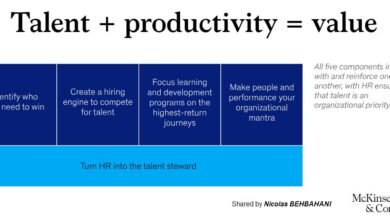
By | Steven Brunker
Small businesses struggle to attract, keep, and motivate employees as competition stiffens. The absence of employee-centric strategies breaks the backbone of the company. There’s no excuse for not having a dedicated HR team. What small business owners lack is a mix of technology and human resources. They would still save money after investing in HR teams and software. How? The resources spent on hiring, training new candidates increase operational costs.
Small businesses have the advantage of building a cohesive unit. They’re perfect candidates to make breakthroughs through innovation, disruptive ideologies.
Leadership and the HR team make a formidable partnership.
- Change Management and Skill-Based Training Programs
The core tasks of human resource management (HRM) is to drive business growth. The responsibility may be associated with the operations team as per the definition. The personnel management part makes HR an active member of it.

The question is how to cope with change management. Small businesses could avert the existential threat. There are two stages- Conducting training programs, addressing employee queries. HR teams start cross-training and skill-upgrade classes long before the time. Top leadership should address workplace-related policies. It brings everybody together, clarifies doubts, and strengthens team spirit.
- Compliance Challenge and Fixing the Adherence Gap
Small businesses, in the absence of HR teams, struggle to follow federal guidelines. The irony is small companies don’t consider these rules meant for them. How could you justify employee misclassification? The cases related to misclassified employees haunt them for years. There are lawsuits, audits, and penalties.
HR professionals look after the technical aspects of the laws. They issue handbooks carrying in-depth knowledge of policies. Employees would find the necessary information related to their rights, responsibilities, and role. HR teams educate on updated laws and recommend reading the Employment Law Guide.
- Hiring Practices and Rewarding the Deserving Candidates
The impact of the absence of strategic HR practices shows in the recruitment process. Every single individual involved in the hiring process suffers a loss. Small businesses fail to attract candidates. It’s not about the packages alone. Candidates prefer waiting than joining a company where the HR system is in disarray. Talented individuals know how big a role HR plays. They’re the engine of the system. They share the workload, keep the organization running.

Small businesses should leverage HR analytics to hire bright minds. They could manage with a small HR team. The secret is to subscribe to the top software to have accurate data. It helps to scout the talent and offer them the right environment to succeed in life.
- Employee Training and Missed Opportunities to Handpick Leaders
Small businesses lag from a constant shortage of workforce. The management expects the new candidates to hit the floor. There is not enough time for training sessions. There’s always a risk of missing the information or not highlighting work-related responsibilities. The work-culture is the penultimate casualty. What happens next? There’s dissatisfaction, low productivity, and time wasted. What about the intricacies of the process and transition period?
HR teams with a limited number of individuals could still compete in the market. Your company could attract, keep, and promote talent. The missing link is to enroll employees in online courses to upgrade their skills. Small sessions by top executives wouldn’t take much time but motivate the teams. The connection between leaders and employees drives performance. When teams could learn from leaders, you could find leaders within the organization.
- Embracing Technology and How to Introduce a Culture of Innovation
HR workways emphasize strengthening the skill-set of team members. Small businesses couldn’t stay behind due to a lack of technological advancements. The change must begin within the organization. HR teams have two challenges. Prepare individuals to embrace technology and harness creative energy. Top management and HR should chalk out a plan.
Top small enterprises invest in technology. They encourage teams to start finding new ways to improve products. The reward is too big to overlook. They could land promotion by showing the efforts of how to use technology to make things better.
- Conflicts and Don’t Forget to Tell Employees They Worth Millions
Employee conflicts, if left unattended, lower the morale. HR teams pay close attention to small issues because they’re the warning signs. Leaders or managers could control the damage but cannot win over both sides of an argument. The role of the HR team is vital. They know how to make employees understand, when to give in to their demands and how to make them feel valued.

HR experts talk about conflicting issues as an area of scope to improve things. It’s a stern test of HR policies, management, and their ability to keep the environment healthy.
- High Attrition Rate and Achieving Work-Life Harmony
Small businesses feel the heat of losing the top performers. Their limited resources couldn’t match the extravagant salary packages, perks, and other facilities. What’s the trick to keeping homegrown talent? Almost every single HR-related question has got its answer in the hiring practices.
When you visit sites like JustLogin, you realize on boarding is a critical phase. It leaves a lasting impression on new candidates. They feel committed. They’ve got a feeling to prove themselves, to justify the decision of hiring managers. HR workways look after the work-life balance. The recreational activities are at the top of their agenda. They try to keep the workplace lively. They don’t leave any opportunity to offer help or make them a part of an extended family.
- Culture Diversification and Setting the Communication Standards
Small businesses have an advantage with teams belonging to different cultures. Their diverse backgrounds bring a healthy opinion on product design, problem-solving skills. There’s a responsibility to create a favorable environment for each member. HR teams set the tone during the recruitment process. The cultural differences could flare the emotions and cause unnecessary trouble.
HR draft guidelines to stop harassment based on race, color, or culture. It’s the last thing you want to take place in your organization. The role of HR is crucial in setting the right expectations. They know how to create a multicultural workplace and strengthen bonding between teams. They conduct sessions to highlight the advantage of working in such an environment. They also conduct sessions to check where the employees stand and how to educate them. These sessions raise awareness levels on how to work in a diversified workplace.
Justlogin helps small businesses to run operations within the company budget. As a business owner, you should invest in the latest technology. It ensures employee satisfaction, instills a sense of ownership among employees.






